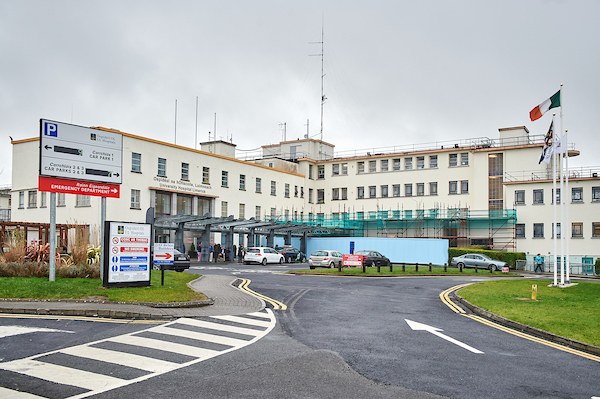MORE Clare patients are at risk of dying from non Covid-19 illnesses due to the “shocking” increase in in-patients waiting lists in the region and the cancellation of surgery in acute hospitals, local councillors have claimed,
HSE West Forum member, Councillor Cillian Murphy has expressed concern about the unaccounted impact of Covid-19 on health services over the coming years in the wake of the “shocking” hike in in-patient waiting lists from 4,798 in Jan 2020 to 7,114 in Jan 2021.
This includes 2,504 patients waiting for treatment in University Hospital Limerick (UHL); 1,416 in St John’s Hospital, Limerick; 1,721 in Nenagh Hospital; 604 in Ennis Hospital and 869 in Croom Orthopaedic Hospital last January.
Out-patients lists also grew dramatically from 47,134 in Jan 2020 to 56,261 during the same period.
There were 44,464 out-patients waiting for treatment in UHL last January; 6,904 in Croom Orthopaedic Hospital; 2,011 in Ennis Hospital; 1,288 in Nenagh Hospital and 1,594 in St John’s Hospital.
Councillor Murphy is very worried about the long term impact of Covid-19.
“When we look back at the impact of the pandemic in ten years’ time, the numbers will show the people who died with Covid-19 will pale into insignificance compared to the people who have died because they haven’t been able to access services due to the incapacity of the health service to cope with the virus and other issues at the same time.”
UL Hospitals’ Group is from this week gradually scaling up scheduled care capacity, commencing with day surgery and endoscopy services.
The majority of scheduled surgery and outpatient appointments across the group were deferred on January 4 as a result of the significant surge in Covid-19 activity early in the New Year.
Emergency and time-critical non-Covid care continued to be prioritised during this period.
While the welcome reduction in Covid-19 activity now allows for this limited restoration of services, the group outlined the health system remains in a recovery phase and the restoration of scheduled care will be phased in gradually, prioritising the most urgent patients.
The group has confirmed it will be applying for funding to hire more doctors and nurses to address spiralling waiting lists.
Councillor Murphy said the waiting lists showed the health system didn’t have the capacity to survive a shock like the Covid-19 pandemic.
The HSE Forum member stressed it was important not to underestimate the fact doctors, nurses and other health care staff have worked extremely hard around the clock trying to cope with the pandemic and to minimise serious illness and deaths from the virus.
Councillor Murphy called on the HSE to initiate an intensive recruitment drive to address the backlog with more than 700 unfilled consultants posts.
“Given the low base the health service was coming from before Covid-19 the increase in waiting lists is expected. The real issue in the future is how do we tackle waiting lists nationally and at county level and get it down to a palatable figure,” he said.“Unless we address the fundamental problems in the health service we could have up to one million people waiting for procedures in the country for many years. We can provide a lot of new beds and infrastructure but the health service comes down to people.”
Councillor Ann Norton said a lot of people with serious underlying conditions, who are waiting for important procedures have been neglected because of the pandemic.
“A lot of people haven’t been able to avail of cancer screening services. The blood transfusion for haemophiliacs was stopped and they were referred back to general practitioners.
“There are a huge amount of services the HSE were providing that were stopped due to Covid-19. I would hate to be on a public waiting list to see a doctor or to have a procedure.
“Whatever chance you have privately, you have no chance publicly,” she stated.
A lot of people will die, said the councillor, because they haven’t the opportunity to get medical appointments or be diagnosed in time for treatment.
“I dread to think of what is coming down the line in view of the fact University Hospital Limerick has struggled to cope with overcrowding even before Covid-19.
“People feel they can’t give out about the lack of services because of the Covid-19 cloud hanging over us,” she said.
Services reopening this week in a reduced capacity include endoscopy services in UHL, Nenagh, Ennis and St John’s; day theatres/surgical day ward in Nenagh and Ennis; additional theatre lists in St John’s and Croom and extra paediatric outpatient appointments.
Plans to restore additional capacity for theatre, diagnostic investigations and outpatient appointments will be announced in due course.
These plans will involve carefully and slowly returning services in line with the national public health guidance and in a manner which optimises patient care while minimising risks to patients, staff and the wider healthcare system.
Prof Brian Lenehan, Chief Clinical Director, UL Hospitals’ Group, said this week, the group marks one year since the first patient with Covid-19 was admitted to UHL.
“The pandemic has also resulted in inordinate disruption to scheduled care over the past 12 months. “Outpatient appointments, inpatient and day case procedures were considerably reduced across the country aligned to the National Action Plan on Covid-19 and the clinical guidance that was developed as part of the response to the pandemic.”
Group chief executive officer, Colette Cowan said staff have put in tremendous efforts to ensure that access for the most urgent and time-critical patients could continue, while also responding to three surges in Covid-19 related activity.
“The group has changed how we work and we are now in a position to gradually increase scheduled care. We are asking our patients to bear with us and to continue to adhere to the public health advice as we all look forward to the further easing of restrictions in healthcare and across society.”
- Dan Danaher


